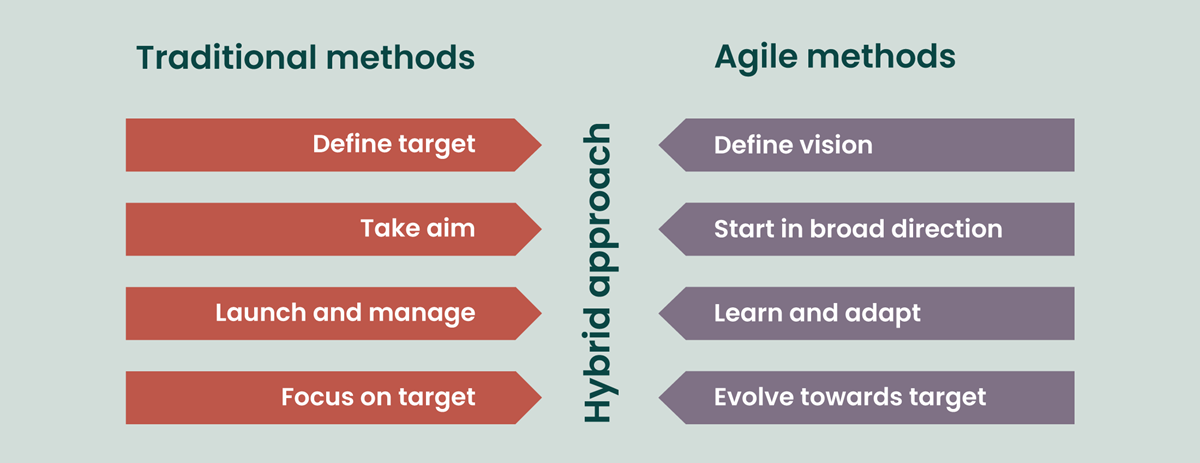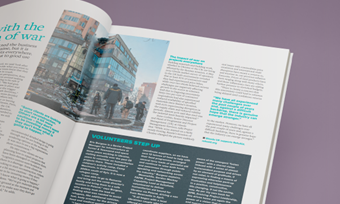
Read more about agile management tools and why we need them.
Agile project management is an iterative approach to delivering a project throughout its life cycle.
Iterative or agile life cycles are composed of several iterations or incremental steps towards the completion of a project. Iterative approaches are frequently used in software development projects to promote velocity and adaptability since the benefit of iteration is that you can adjust as you go along rather than following a linear path.
One of the aims of an agile or iterative approach is to release benefits throughout the process rather than only at the end. At the core, agile projects should exhibit central values and behaviours of trust, flexibility, empowerment and collaboration.

We need agile project management because it helps us focus on what matters. Becoming more agile through organisations and team’s brings flexibility to change and allows us to deliver value often with continuous feedback.
The goal is not to ‘be agile’ the goal is to improve. With an incremental and iterative approach, we increase predictability and control risk.

The agile management philosophy concentrates on empowered people and their interactions, and early and constant delivery of value into an enterprise.
Iterative or agile project management focuses on delivering maximum value against business priorities in the time and budget allowed, especially when the drive to deliver is greater than the risk. Some agile principles include:
The move to becoming an agile organisation brings change. It impacts on the traditional culture and introduces new ways of working on projects – so not everyone will be convinced. What does it take to successfully introduce that change?
This is a member only resource. Not a member? Join today
When approaching agile project management for the first time, it becomes apparent that there are various trains of thought. Some people believe it’s the best thing since sliced bread. Others are less convinced, seeing it as an excuse to wreak havoc on tried-and-tested delivery processes. We clear up some of the main misconceptions and share a holistic view of what agile project management is (and crucially, what it is not).
Interview with Sue Clarke
This APM Research Fund study builds on the APM North West Volunteer study on the practical adoption of agile methodologies which provided a review of approaches at a project level, this study aims to investigate the level of practical adoption of those programme and portfolio components addressed by scaled agile methodologies.
The objective of the study was to understand the extent to which scaled agile tools, techniques and roles are practically in place in corporate portfolio, programme, project and development management methodologies, to determine the level of corporate commitment to exploiting scaled agile, e.g. pilot, full use, selective based on need, as well as drivers for selection or deselection of the framework based on the overheads.
These four aspects highlight the difference between agile and waterfall (or more traditional) approaches to project management:
Agile approaches empower those involved; build accountability; encourage diversity of ideas; allowing the early release of benefits; and promotion of continuous improvement.
Agile helps build client and user engagement because changes are incremental and evolutionary rather than revolutionary: it can therefore be effective in supporting cultural change that is critical to the success of most transformation projects.
Agile allows decision ‘gremlins’ to be tested and rejected early: the tight feedback loops provide benefits in agile that are not as evident in waterfall.

There are various iterative or agile techniques that can suit any project method, they’re not limited to agile. You also don’t have to use them all; choose the ones that work for you, your team and the project.
This infographic is brought to you by the interactive APM Learning module.
Emma meets Adrian Dooley, who has 45 years’ experience in project management. He is the founder and lead author of the Praxis Framework.
In this podcast, he shares how, in his experience, many fads rise to prominence and then become integrated into good practice. He believes agile will follow that same path.
Iterative or agile terminology can be confusing. We have compiled a list of the most common agile terminology you may come across, and their definitions:

Read more about agile management tools and why we need them.

Change and disruption is a normal part of modern life. Twenty years ago, the median age of leading firms was 85 years; today it’s closer to 30 years... Read more.

It’s been 20 years since the term ‘agile’ first appeared as a set of principles for software development ... Read more.

Let’s first start with the very basics, what is scrum? ... Read more.



The use of agile in project management remains relatively new and is evolving for many organisations.

A panacea or placebo for project delivery?

This article looks at the benefits, or not, of applying an agile method of project management, as opposed to more traditional methods.

A study to understand scaled agile tools, techniques and roles.

Agile needs more from a project manager in way of communication for risks, issues and stakeholder management, as speed of resolution is of the essence. By members of the APM North West branch.

This paper will discuss the EVM techniques which have been adopted to provide the benefits of traditional EVM in agile projects.

The APM Learning portal is an online resource which provides members with access to digital guides, modules and other digital learning resources as part of the membership benefit.


Project – APM's official journal – is circulated quarterly for members only, and online for regularly updated news, blogs, opinions and insights for those in the project community.
